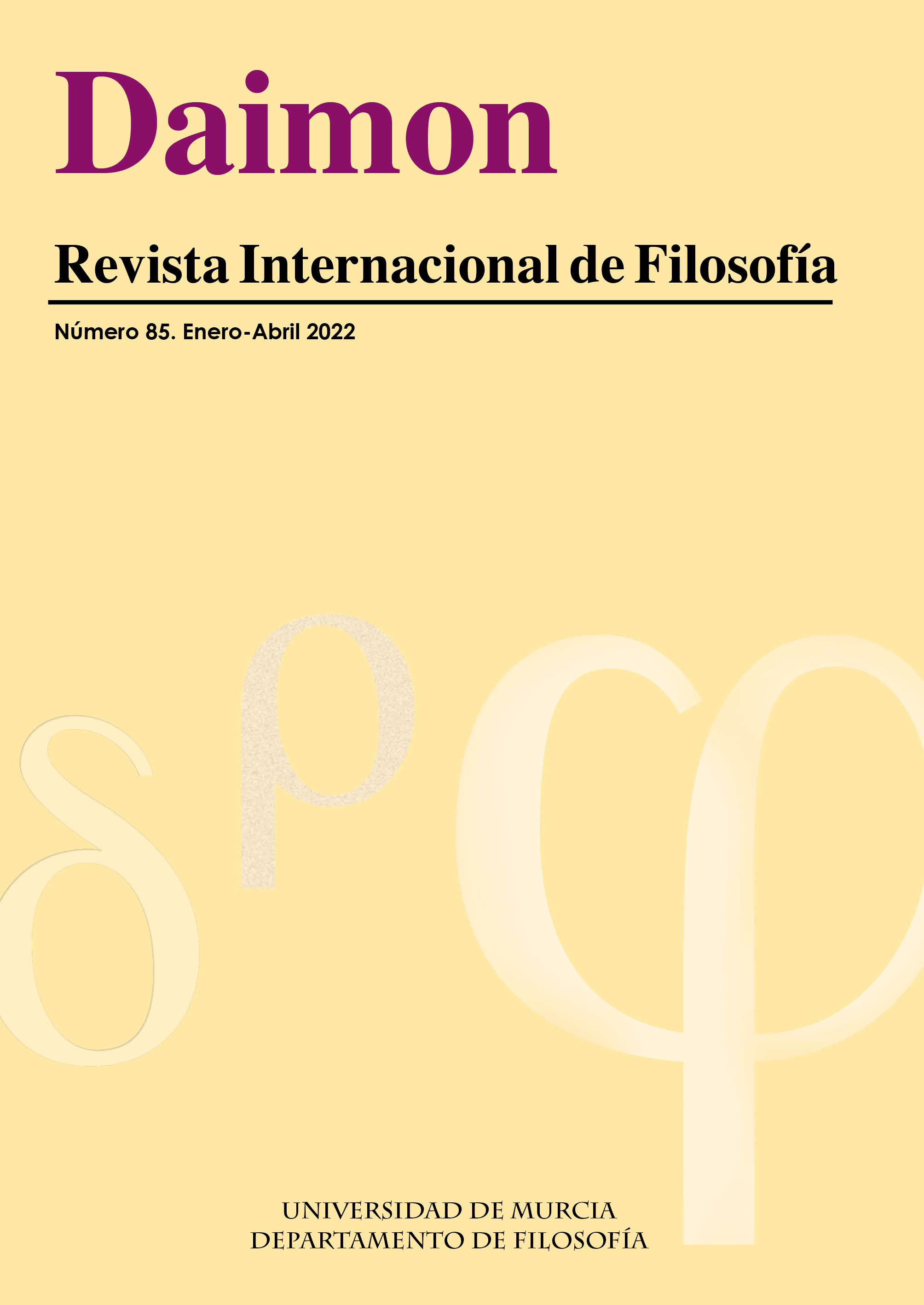Panpsiquismo de construcción
Résumé
El principal problema del panpsiquismo es el problema de la combinación. Como solución se distinguen dos tipos de panpsiquismo: el panpsiquismo constitutivo y el panpsiquismo emergentista. Pero esta distinción opera sobre la distinción entre fundación y causalidad. Sin embargo, se verán razones para considerar que causalidad y fundación no son distintos. De modo que la distinción entre los anteriores panpsiquismos colapsa. Posibilitando la postulación de un nuevo tipo de panpsiquismo, el panpsiquismo de construcción. También, se trazará un primer esbozo de solución para el problema de la combinación desde el punto de vista del panpsiquismo de construcción.
Téléchargements
-
Résumé994
-
PDF (Español (España))565
-
HTML (Español (España))704
Références
Alter, T., & Nagasawa, Y. (2015), «What is Russellian Monism?», en: Alter, T. y Nagasawa, Y. (eds.): Consciousness in the Physical World. Perspectives on Russellian Monism, Oxford: Oxford University Press, pp. 422-451.
Alvarado, J. T. (MS), «Fundación y causalidad», <https://www.academia.edu/38243815/Fundacio_n_y_causalidad.pdf>.
Barnes, E. (2012), «Emergence and Fundamentality», Mind, 121 (484), pp. 873-901.
Bennett, K. (2011a), «By Our Bootstraps», Philosophical Perspectives, 25, pp. 27-41.
Bennett, K. (2011b), «Construction area (no hard hat required)», Philosophical Studies, 154, pp. 79-104.
Bennett, K. (2017), Making Things Up. Oxford: Oxford University Press.
Briceño, S. (2015), «Amie L. Thomasson. Ontology made easy», Cuadernos de Filosofía, 33, pp. 97-102.
Chalmers, D. (1999), La Mente Consciente. Barcelona: Editorial Gedisa.
Chalmers, D. (2010), «Consciousness and its Place in Nature», en: Chalmers, D. (ed.): The Character of Consciousness, Oxford: Oxford University Press, pp. 103-139.
Chalmers, D. (2017), «The Combination Problem for Panpsychism», en: Brüntrup, G. y Jaskolla, L. (eds.): Panpsychism. Contemporary Perspectives, Oxford: Oxford University Press, pp. 179-215.
Fine, K. (2001), «The Question of Realism», Philosophers' Imprint, 1 (2), pp. 1-30.
Fine, K. (2012), «Guide to Ground», en: Correia, F. y Schnieder, B. (eds.): Metaphysical Grounding. Understanding the Structure of Reality, Cambridge: Cambridge University Press, pp. 37-80.
Goff, Ph. (2017), Consciousness and Fundamental Reality. New York: Oxford University Press.
Goff, Ph. (MS), «Cosmopsychism, Micropsychism and the Grounding Relation», <http://www.philipgoffphilosophy.com/uploads/1/4/4/4/14443634/cosmopsychism_and_micropsychism.pdf>.
Goff, Ph. Seager, W. & Allen-Hermanson, S. (2017), «Panpsychism», en: Zalta, E. N. (ed.): The Stanford Encyclopedia of Philosophy, <https://plato.stanford.edu/entries/panpsychism/>.
Heil, J. (2015), The Universe as We Find It. Oxford: Oxford University.
Hume, D. (1988). Investigaciones sobre el Conocimiento Humano. Madrid: Alianza.
Humphreys, P. (1997), «How Properties Emerge», Philosophy of Science, 64 (1), pp. 1-17.
James, W. (1983), The Principles of Psychology. Massachusetts: Harvard University Press.
Kivatinos, Th. (2017), Grounding, Causation and the Unity of Ontological Structure (Tesis doctoral), <https://academicworks.cuny.edu/cgi/viewcontent.cgi?article=3429&context=gc_etds>.
Kment, B. (2014), Modality and Explanatory Reasoning. New York: Oxford University Press.
Mørch, H. H. (2014), Panpsychism and Causation: A New Argument and a Solution to the Combination Problem (Tesis doctoral), <https://philpapers.org/archive/HASPAC-2.pdf>.
Mørch, H. H. (MS), «The Argument for Panpsychism from Experience of Causation», <https://philarchive.org/archive/MRCTAF>.
Mumford, S. y Anjum, R. L. (2011), «Fundamentals of Causality», Information Knowledge Systems Management, 10, pp. 75-84.
Nagel, T. (2003), «¿Cómo es ser un murciélago?» en: Ezcurdia, M. y Hansberg, O. (comps.): La Naturaleza de la Experiencia. Volumen I: Sensaciones, México, D.F.: Universidad Nacional Autónoma de México, pp. 45-63.
Rabin, G. O. & Rabern, B. (2016), «Well Founding Grounding Grounding», Journal of Philosophical Logic, 45 (4), pp. 349-379.
Raven, M. J. (2015), «Ground», Philosophy Compass, 10 (5), pp. 322-333.
Schaffer, J. (2009), «On What Grounds What», en: Chalmers, D., Manley, D. y Wasserman, R. (eds.): Metametaphysics. New Essays on the Foundations of Ontology, Oxford: Clarendon Press, pp. 347-383.
Schaffer, J. (2010), «Monism: The Priority of the Whole», Philosophical Review, 119, pp. 31-76.
Schaffer, J. (2016), «Grounding in the Image of Causation», Philosophical Studies, 173, pp. 49-100.
Schaffer, J. (MS), «Taking Causing Out of Bennett’s Making Things Up», <http://www.jonathanschaffer.org/bennett.pdf>.
Seager, W. (2010), «Panpsychism, Aggregation and Combinatorial Infusion», Mind & Matter, 8 (2), pp. 167-184.
Seager, W. (2017), «Panpsychist Infusion», en: Brüntrup, G. y Jaskolla, L. (eds.): Panpsychism. Contemporary Perspectives, Oxford: Oxford University Press, pp. 229-248.
Strawson, G. (1987), «Realism and Causation», Philosophical Quarterly, 37 (148), pp. 253-277.
Trogdon, K. (2018), «Grounding-mechanical explanation», Philosophical Studies, 175 (6), pp. 1289-1309.
Van Gulick, R. (2001), «Reduction, Emergence and Other Recent Options on the Mind/Body Problem. A Philosophic Overview», Philosophical Quarterly, 37 (148), pp. 253-277.
Wilson, A. (2018), «Metaphysical Causation», Noûs , 52 (4), pp. 723-751.
Wilson, A. (MS), «Making Things Up, by Karen Bennett», <http://alastairwilson.org/files/brweb.pdf>.
Las obras que se publican en esta revista están sujetas a los siguientes términos:
1. El Servicio de Publicaciones de la Universidad de Murcia (la editorial) conserva los derechos patrimoniales (copyright) de las obras publicadas, y favorece y permite la reutilización de las mismas bajo la licencia de uso indicada en el punto 2.
2. Las obras se publican en la edición electrónica de la revista bajo una licencia Creative Commons Reconocimiento-NoComercial-SinObraDerivada 3.0 España (texto legal). Se pueden copiar, usar, difundir, transmitir y exponer públicamente, siempre que: i) se cite la autoría y la fuente original de su publicación (revista, editorial y URL de la obra); ii) no se usen para fines comerciales; iii) si remezcla, transforma o crea a partir del material, no podrá distribuir el material modificado.
3. Condiciones de auto-archivo. Se permite y se anima a los autores a difundir electrónicamente las versiones pre-print (versión antes de ser evaluada) y/o post-print (versión evaluada y aceptada para su publicación) de sus obras antes de su publicación, ya que favorece su circulación y difusión más temprana y con ello un posible aumento en su citación y alcance entre la comunidad académica. Color RoMEO: verde.











